We’re making learning a cooperative, social activity with our new item sharing mechanism!
Author: Mike Hall
Get Phoenicia beta 2 now!
Phoenicia is nearing it’s first stable release, with the second beta version being published to Google Play today! Download it now from the image below, then keep reading to find out what’s new in this release.
 What’s new?
What’s new?
While testing the first beta with select children and adults, the one consistent set of feedback we received was a need to explain how the game worked, what the elements did, and how to use them to advance the game play. To solve this problem we up-ended many parts of Phoenicia’s internal processes and structures to support an introduction tour that can be customized in each Locale Pack to be specific to the language, word order, and map layout the player is using.
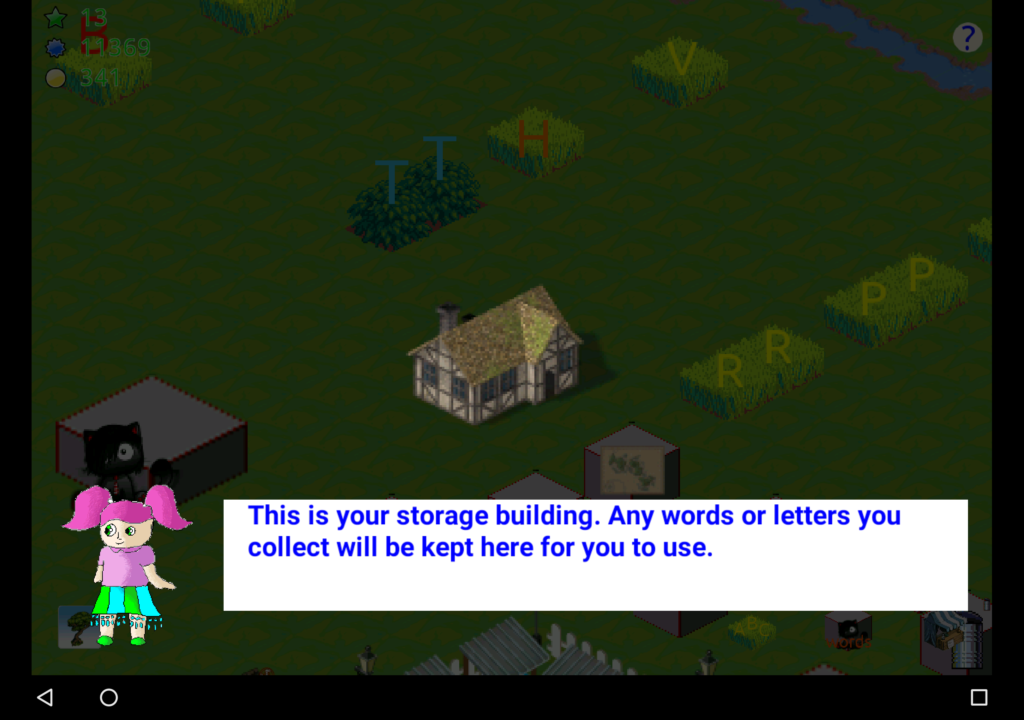
The tour will pop up at several times during the game, as you unlock new features it will be there to introduce that feature to you and walk you through the first use of it. Locale authors will need to provide translated text and recordings for this, but we maintained Phoenicia’s goal of never requiring any custom programming to support a Locale.
Speaking of Locales, after the beta 1 release we were contacted by several people who were interested in helping us expand the languages and cultures available in Phoenicia, and within just a couple of days we had a working Spanish locale thanks to Guido Vera. This really illustrates the advantage of our “no custom programing” rule, and shows that Phoenicia will be able to efficiently scale out to many more languages and locations using community contributors.
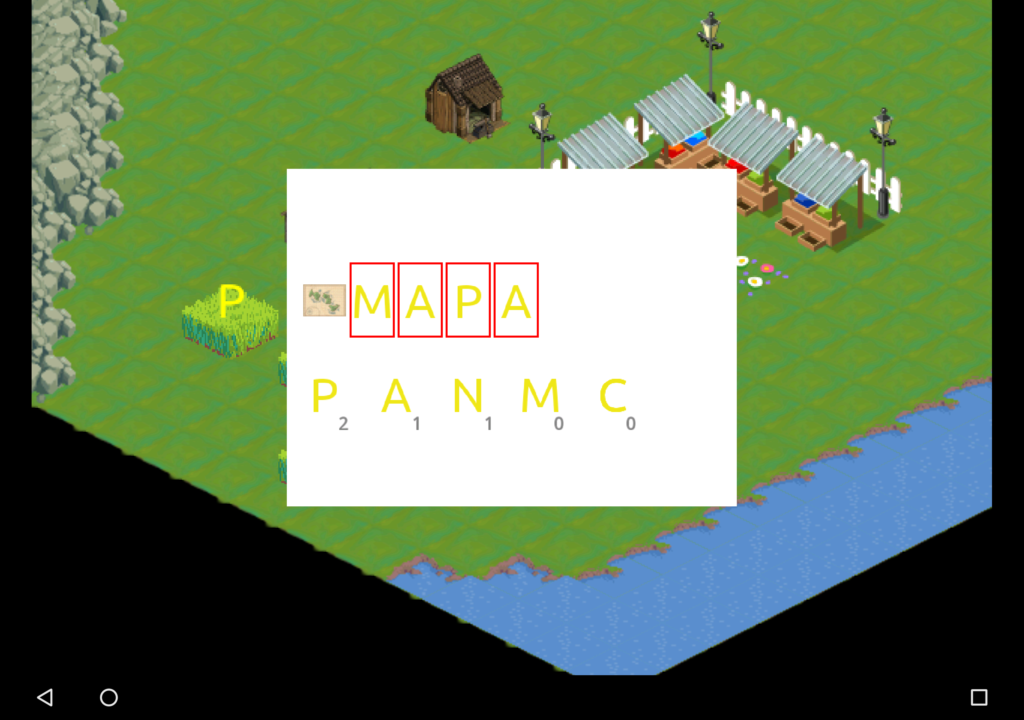
Adding a Spanish locale was relatively easy, but it uses the same alphabet as English and Kiswahili. Supporting non-latin alphabets turned out to be not so simple, and brought to light a number of assumptions the code was making based on the original alphabet. However, with a little bit of work, we were able to get an example Farsi locale running using a unicode alphabet. There remains work to be done to properly support Right-to-Left languages, and alphabets where combined characters change their shape based on those around them. But it shows that the fundamental nature of Phoenicia will work for any phonetic-alphabet, not just western ones.
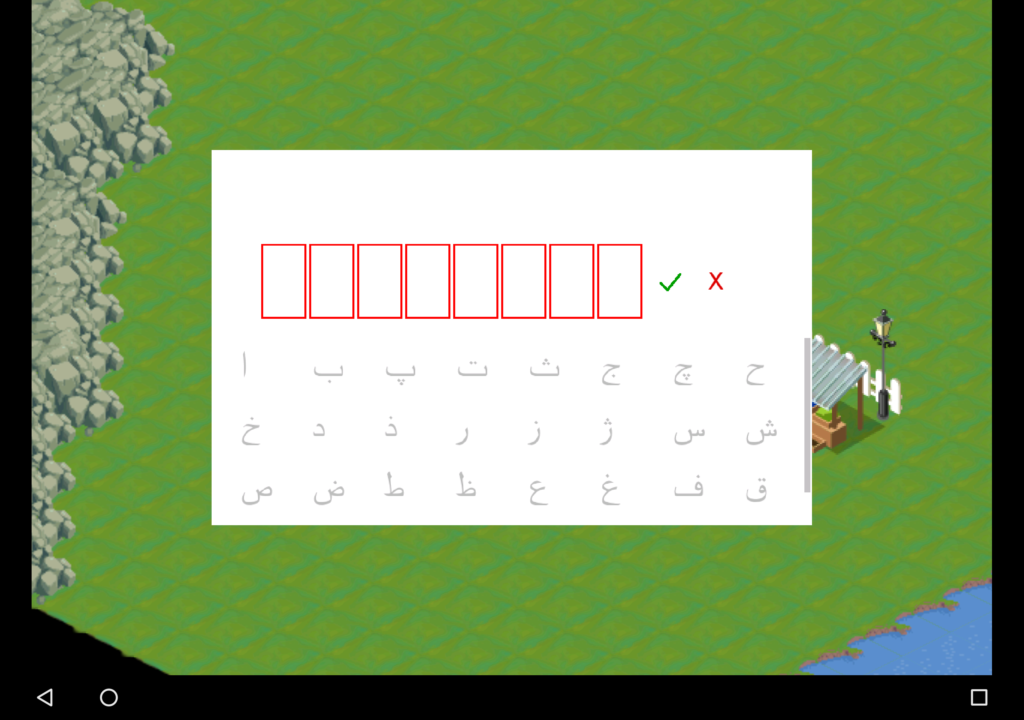
All that remains to be done before the final 1.0 release and XPRIZE submission is to incorporate the final artwork (you can see the first of it in the Marketplace building), finalize the Kiswahili locale and record audio for it, and add the last two mini-games that will introduce counting and number recognition as educational elements.
You can try Phoenicia beta 2 yourself on any Android phone or tablet. Click the image below to be added to our beta program. If you’ve installed the previous beta, you will be getting this latest update shortly! Feedback of any kind is most welcome, and contributions of locale packs, especially in French, Portuguese and Kiswahili. If you can help, leave a comment below or email me directly.
Beta 1 Released!
Hey everyone, our first Beta release is officially out! If you joined our Alpha testing through the Play Store already, you should be getting the update automatically. If you haven’t joined yet, you can do so by clicking the image below:
 What’s new?
What’s new?
We’ve made the marketplace much smarter, and reactive to the player. To do this we introduced purchaser “profiles” that choose the requested items and their quantity based on specific goals, such as helping the player get rid of excess inventory items, gathering letters and words they haven’t used very often, or pushing them to complete the current level and move on to the next.
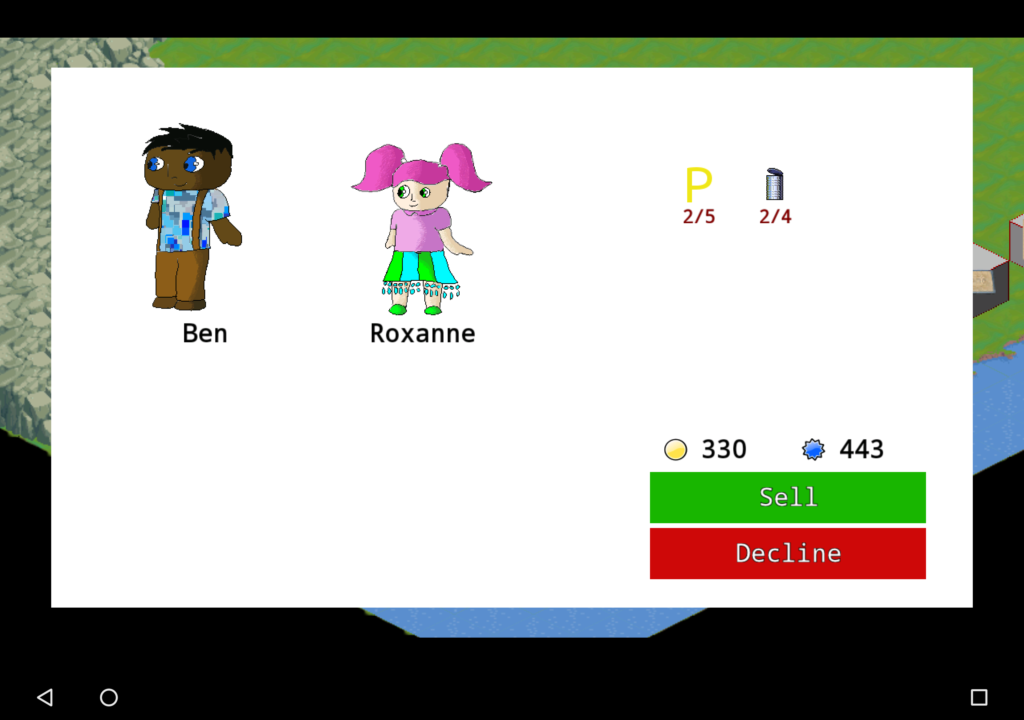
Speaking of new levels, there are now two new dialogs you will see. The first is displayed at the start of each new level, showing you what new items have been unlocked for you, as well as how many coins and points you’ve earned by reaching that level. The second, which can be activated by tapping the level’s star icon in the default view, will show you what items (and how many of them) you need to gather before you can move on to the next level.
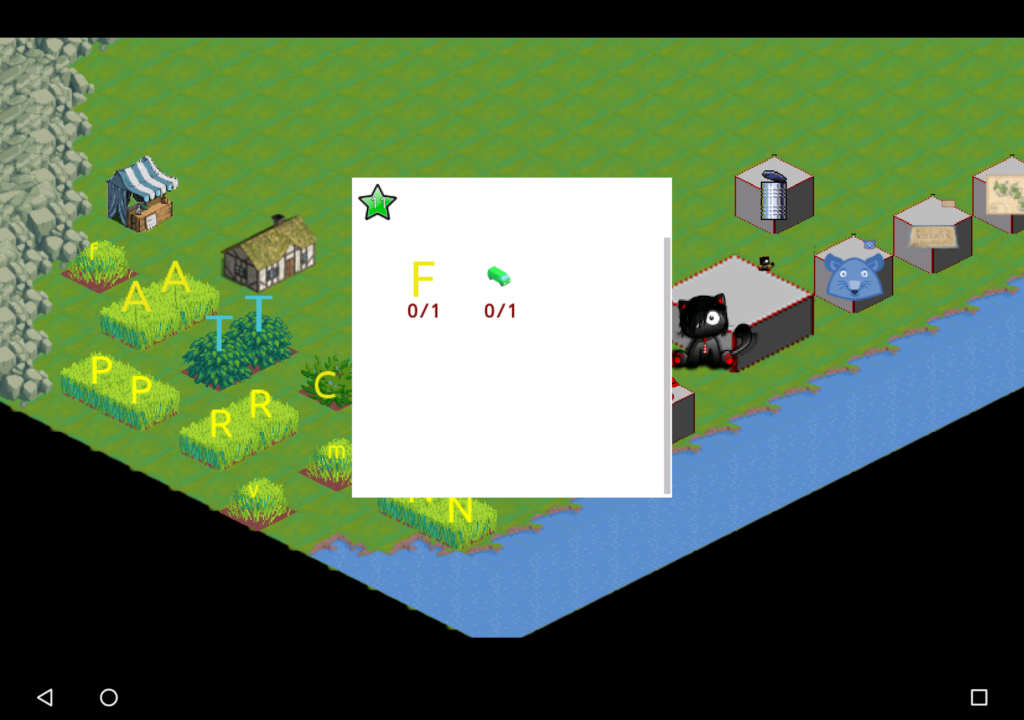
The first two mini-games have also arrived. In the first you must match a series of word images to the corresponding spelling of the word. In the second it’s reversed and you must match a spelled word with the image it represents. If you can make it through getting fewer than 3 wrong, you win one of the words you correctly matched, plus some extra coins. But, win or lose, you have to wait a while between playing, so be sure to pay attention! Many more games are planned, and you will be able to give different levels of difficulty to them to keep it challenging.
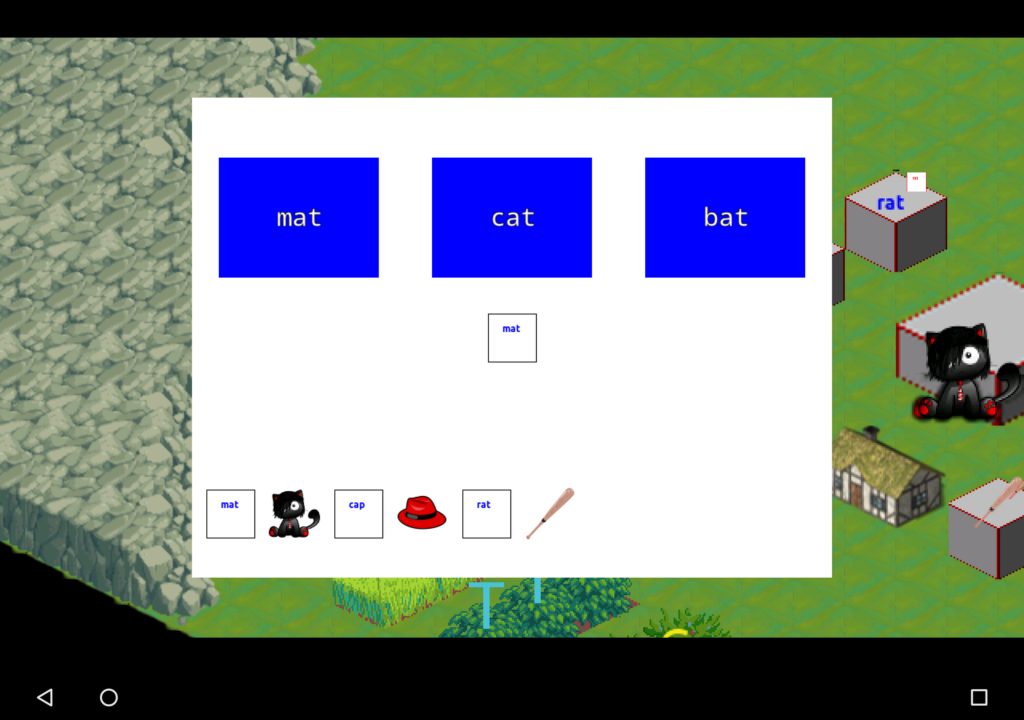 There have also been a number of smaller UI/UX changes that make the game play a little smoother. For starters, any scrollable elements will now display a scrollbar both to indicate that it’s scrollable, and to show your scroll position. All HUD displays can now be closed by tapping on an area that shows the background map, while play-testing we found that this was what the players expected and they tried to do it without even thinking, so we changed it to match. You’ll also notice that when you tap a letter or work that’s building, the indicator that appears will tell you the actual time remaining, rather than the percentage, which is another thing play-testing proved to be the expectation. Finally, we’ve added some more placeholder art to help get you through the first several levels.
There have also been a number of smaller UI/UX changes that make the game play a little smoother. For starters, any scrollable elements will now display a scrollbar both to indicate that it’s scrollable, and to show your scroll position. All HUD displays can now be closed by tapping on an area that shows the background map, while play-testing we found that this was what the players expected and they tried to do it without even thinking, so we changed it to match. You’ll also notice that when you tap a letter or work that’s building, the indicator that appears will tell you the actual time remaining, rather than the percentage, which is another thing play-testing proved to be the expectation. Finally, we’ve added some more placeholder art to help get you through the first several levels. 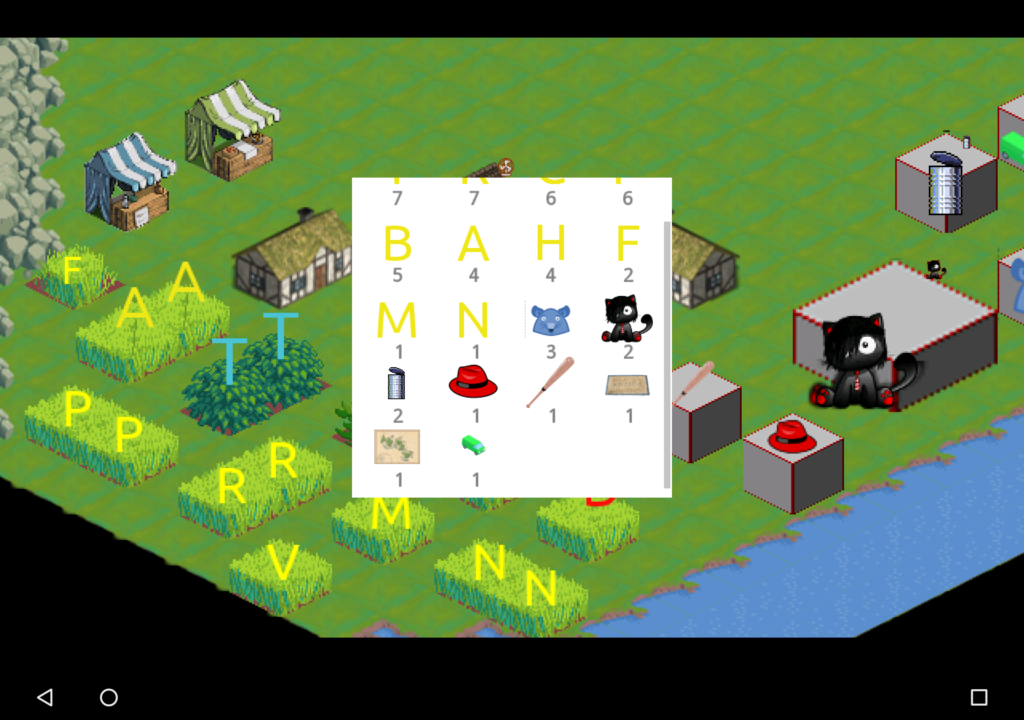 There has also been a major change to the locales. A new set of tools has been developed to help locale authors get started. All you need to provide is an alphabet and a list of words, and these tools will generate a working locale manifest, complete with levels and progressively increasing values for cost and build time for your letters and words. You can even generate placeholder images for both letters and words so you can play your locale right away. These tools will continue to be developed, and will be the used for both our English and Kiswahili levels.
There has also been a major change to the locales. A new set of tools has been developed to help locale authors get started. All you need to provide is an alphabet and a list of words, and these tools will generate a working locale manifest, complete with levels and progressively increasing values for cost and build time for your letters and words. You can even generate placeholder images for both letters and words so you can play your locale right away. These tools will continue to be developed, and will be the used for both our English and Kiswahili levels.
Beta 2
We’re now hard at work on Beta 2, which is due out at the end of September. You can try Beta 1 now from the Play Store, and you will be automatically updated to Beta 2 when it comes out. As always, feedback, bug reports, and contributions are always welcome!
Halfway to Beta
This month we’re excited to be making another public release of Phoenicia into the Google Play Store. This Alpha 2.5 release gets us halfway to the first Beta milestone of our development, and things are really starting to come together quickly.
Multi-user sessions
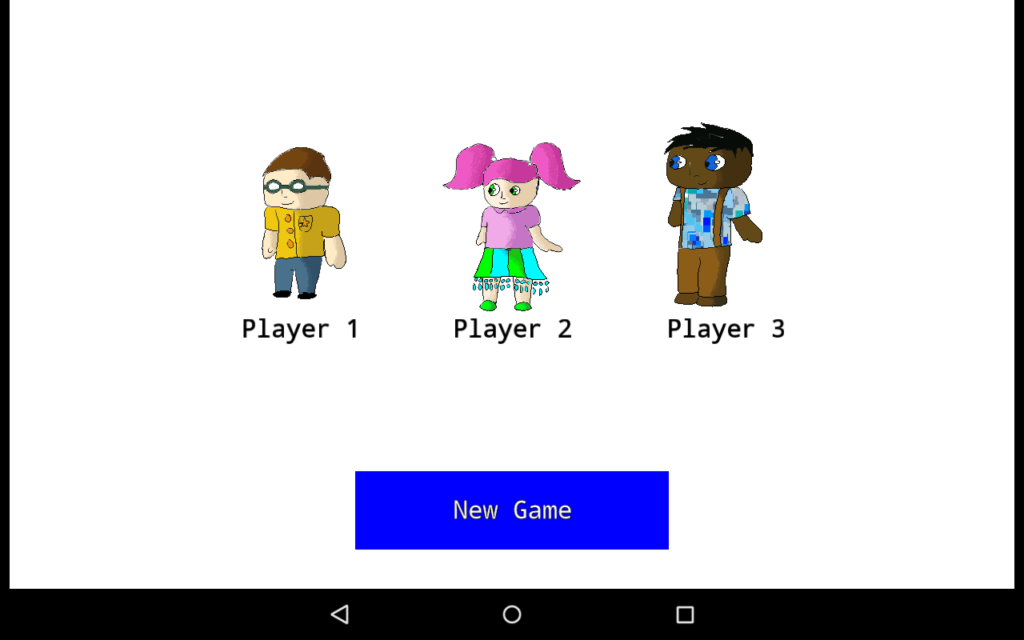
While the underlying code has supported having multiple saved sessions, there wasn’t a graphical way to actually take advantage of that. Until now. Not only does this allow you to have sessions in different languages, it also supports having multiple players in the same language, each with their own progress and personalization. This is going to be important for the XPRIZE field trials, where the children who get tablets may be sharing them with other siblings.
Word Workshop
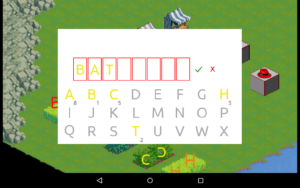
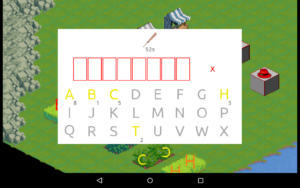 One of the important things we want Phoenicia to show children is that knowledge has value, both to themselves and to others. So we want them to be able to use that knowledge at any point in their game play. For that purpose we are complimenting the standard word building tiles with a Workshop where players can build any word that they know how to spell, whether or not they’ve been exposed to it by the game yet. Moreover, it lets them share the words they learn in the game with their friends who haven’t reached those levels yet, giving their knowledge a social value.
One of the important things we want Phoenicia to show children is that knowledge has value, both to themselves and to others. So we want them to be able to use that knowledge at any point in their game play. For that purpose we are complimenting the standard word building tiles with a Workshop where players can build any word that they know how to spell, whether or not they’ve been exposed to it by the game yet. Moreover, it lets them share the words they learn in the game with their friends who haven’t reached those levels yet, giving their knowledge a social value.
Mini-games are coming
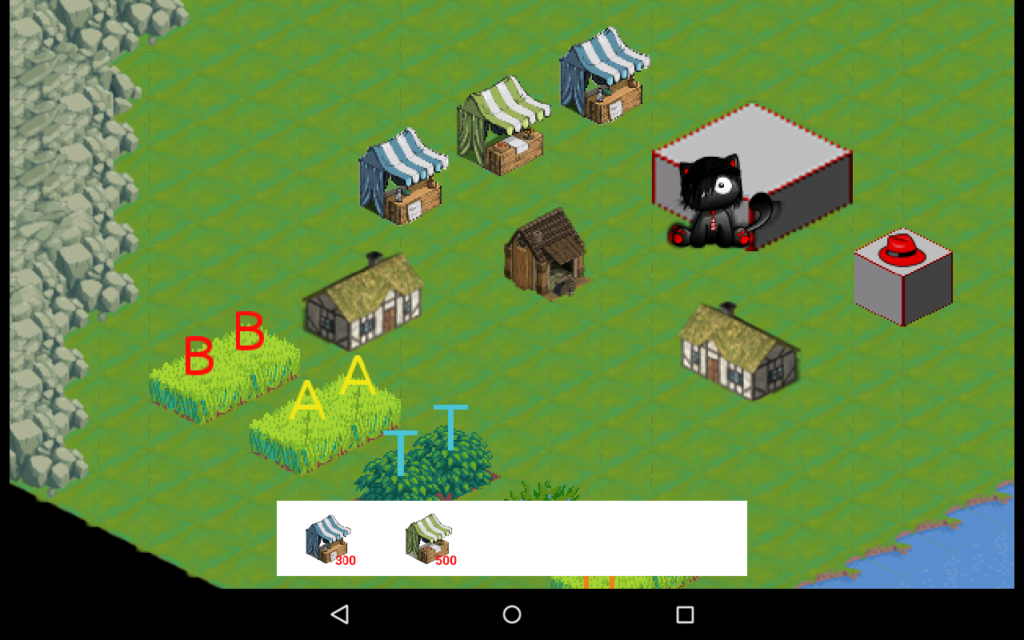
While the main game play of Phoenicia is geared towards teaching kids how to read, there’s a need for more than that. In order to teach numeracy, sequencing as well as reinforcing the literacy skills learned in the main game, we will be introducing a set of mini-games that can be unlocked by the player. While the games themselves haven’t been written yet, the framework for them is now in place.
Making it yours
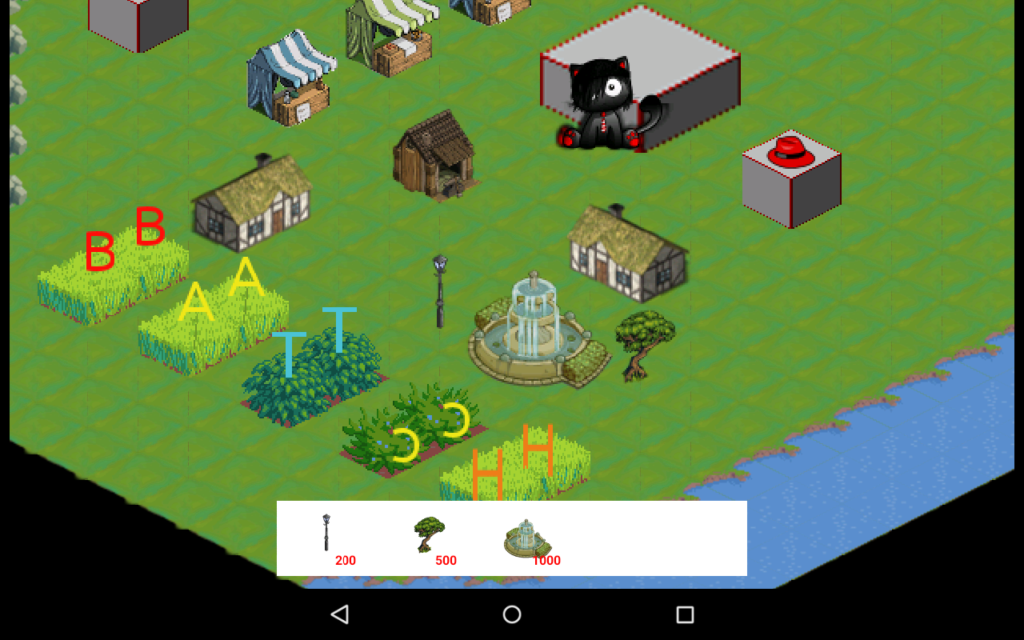 Personalization is important, especially to young kids. They like to customize things and make them their own. Creativity and learning go hand-in-hand, and we want Phoenicia to allow for both. So we’re introducing decorative tiles that will let them build their own unique world. These decorations will be unlocked as they play, and will give them a reason to keep playing and learning.
Personalization is important, especially to young kids. They like to customize things and make them their own. Creativity and learning go hand-in-hand, and we want Phoenicia to allow for both. So we’re introducing decorative tiles that will let them build their own unique world. These decorations will be unlocked as they play, and will give them a reason to keep playing and learning.
Beta 1
We’re now working towards out next big milestone, and at the end of this month we will be releasing our first Beta release. We’re already halfway through the month, and some of the highlights above were actually done in the past two weeks, but there’s still more on the roadmap for this milestone so stay tuned for our next update.
In the mean time, you can download Phoenicia Alpha 2.5 from the Google Play Store following this link, and leave us feedback either through the store or on our new chat channel.
Phoenicia Alpha 2 release
We have reached our planned Alpha 2 Milestone, and with it we’re very excited to announce the availability in the Google Play Store for anybody who wants to test it! To install Phoenicia alpha 2 on your device, follow this link: https://play.google.com/apps/testing/com.linguaculturalists.phoenicia
Once installed, you will get updates every time I push a new version to the Play Store, which will be roughly every month to coincide with these update announcements. Please report any bugs, crashes, or confusing things to our GitHub Issues page.
Common Audio Repository
There has been on-again, off-again talks about cross team collaboration on this prize, and in an attempt to kickstart that I asked @edmcnierney if we could have a common GitHub repository where we should share resources, and he was kind enough to set that up: https://github.com/XPRIZE/GLEXP-Common-Audio
I have already uploaded all of Phoenicia’s audio recordings for the US English alphabet, both letter names and phoneme, using a Creative Commons license that is compatible with the XPRIZE rules. I invite any team that wants them to use them, and also to contribute other assets that you think would be useful and foster collaboration.
New Chat for XPRIZE teams
Before the Global Learning XPRIZE officially started, Jono Bacon setup an IRC channel at #xprize-community on Freenode, but it was rarely ever used. Discussions here on the forum were more active, but the latency between posts made for slow conversations. I had recently started using Gitter, a modern chat service built around GitHub, for another project, and thought it would be useful for XPRIZE teams as well. There is a common XPRIZE channel as well as the ability to create new ones based on individual repos. I’ve already created one for Phoenicia.
It’s open to anybody in the XPRIZE organization on GitHub to join (you should have been given an invite from Ed at the start of the contest), and we’ve already had many fantastic discussions on there. Its GitHub integration makes it easy to reference code and issues related to your project, and it gives activity updates in a side bar. Please come and join is there: https://gitter.im/XPRIZE
Word Builder Queues
Previously building a word in Phoenicia was instantaneous, as long as you had the necessary letters, but the plan was always to make that process take time, so that the player would need to plan ahead. With this update the word building screen has been updated and word building now takes the amount of time designated in the Locale definition. You can also queue up more than one to build (again, if you have the necessary letters) and they will be built one after the other, with an audible notification when they are finished.
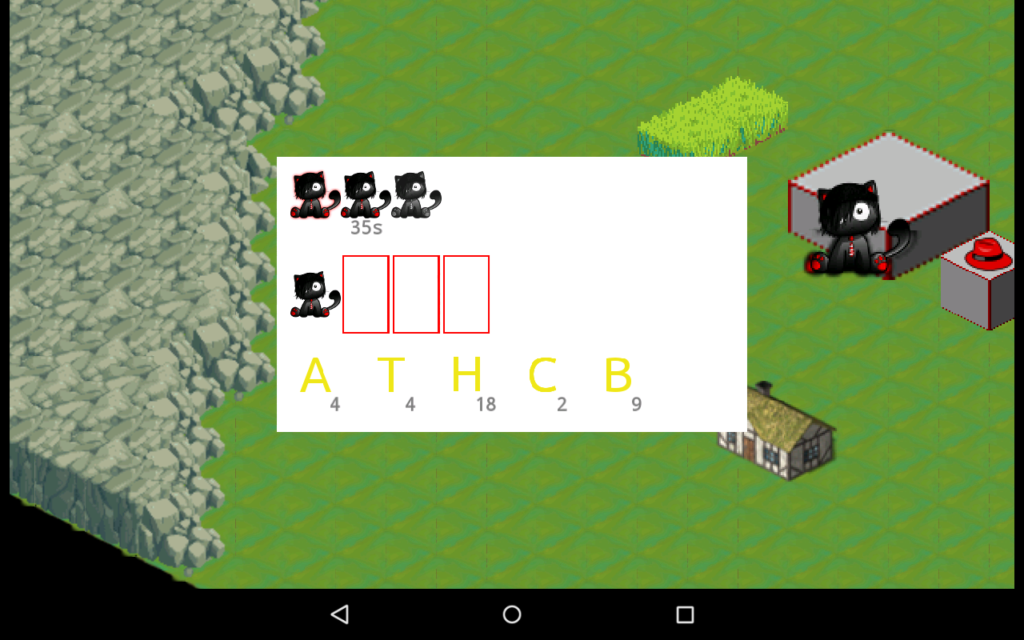
The player is now also responsible for going back and collecting the built words before they can be used to fulfill market requests.
Beta 1
May was a slow month for features. The above work required some major refactoring to the underlying code, both for the word building screens and the background builder objects, which meant that little else was done. Learning how to build and sign release APKs that were suitable for the Play Store was another challenge (if anybody has questions or needs help with that, please let me know). June has already seen quite a bit of changes, but I will save those until the next update. The next major milestone for Phoenicia will be the Beta 1 release, currently scheduled for the end of July. If you want see everything that happening, you can always follow us on GitHub and try the code yourself.
Phoenicia Alpha 1 is here!
March was a very busy month for Phoenicia’s development, but it ended on a high note with a public presentation and our first alpha release!
Phoenicia at XPRIZE Summit
The XPRIZE organization has been hosting several summit events for the Global Literacy prize, but unfortunately we were not able to attend them, as the closest one was 1,000 miles away in Washington DC. However one of the attendees, Patrick Morris-Suzuki, generously offered to demo Phoenicia for us. If you weren’t their either, you can watch the video that we made for him below. And many thanks to Patrick for doing this.
Locale Selection
I had started this month’s development with the intention of finishing the Marketplace feature, but once I found out that Phoenicia was going to be shown off at the Summit I quickly changed gears and focused on adding support for different Locale Packs so that a Kiswahili version would be part of the demonstration. This required quite a bit of refactoring, since many parts of the codebase had been written to expect only one globally-define locale.
With that work done, and test cases written or modified to support it, I could then focus on developing the Kiswahili locale pack itself. I obviously didn’t have time enough to build a proper localized version, but I was at least able to show it using different letters, words and artwork from the English version.
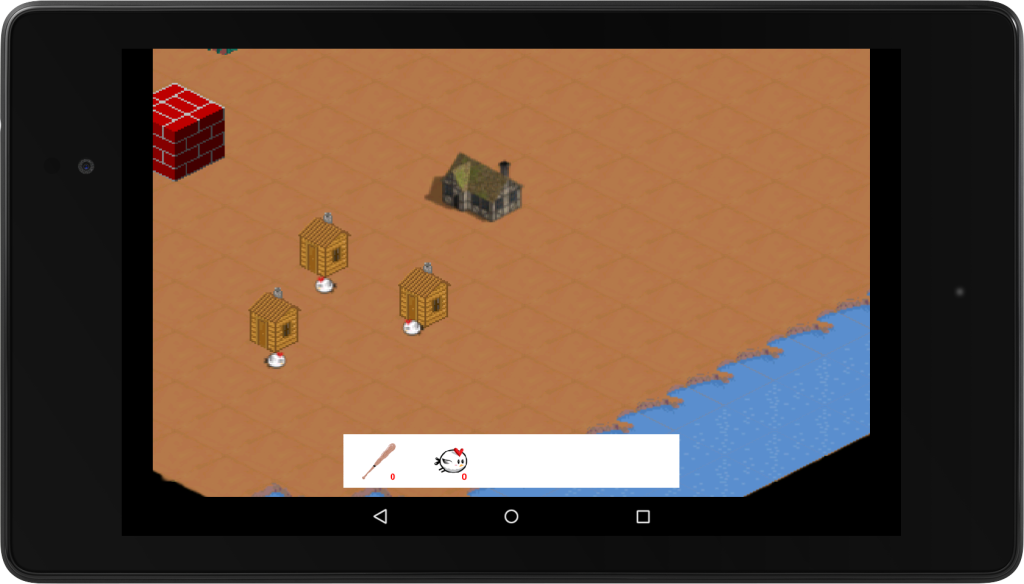
First Alpha Release
March also marked the end of our Alpha 1 development cycle. With the addition of the Locale selection, it’s a fitting time to make our very first release available for wider testing. We still have many features to add and bugs to squash before the game is ready, but this is an important milestone in our road to the XPRIZE finals, and we’re excited to make it available to all of you. If you know how to sideload apps, you can download the Alpha 1 APK from our GitHub page.
Looking towards Alpha 2
We’re not slowing down now, there’s still much to do. Development on the Marketplace has picked up again and will be the next major feature to land. The Marketplace is an important part of Phoenicia’s game play, and will serve as one of the primary mechanisms for progressing the player through the levels of the game. Beyond that we’ll be expanding the capabilities of the map and block placement on it, polishing the locale pack support, and hopefully start introducing lots of new artwork too.
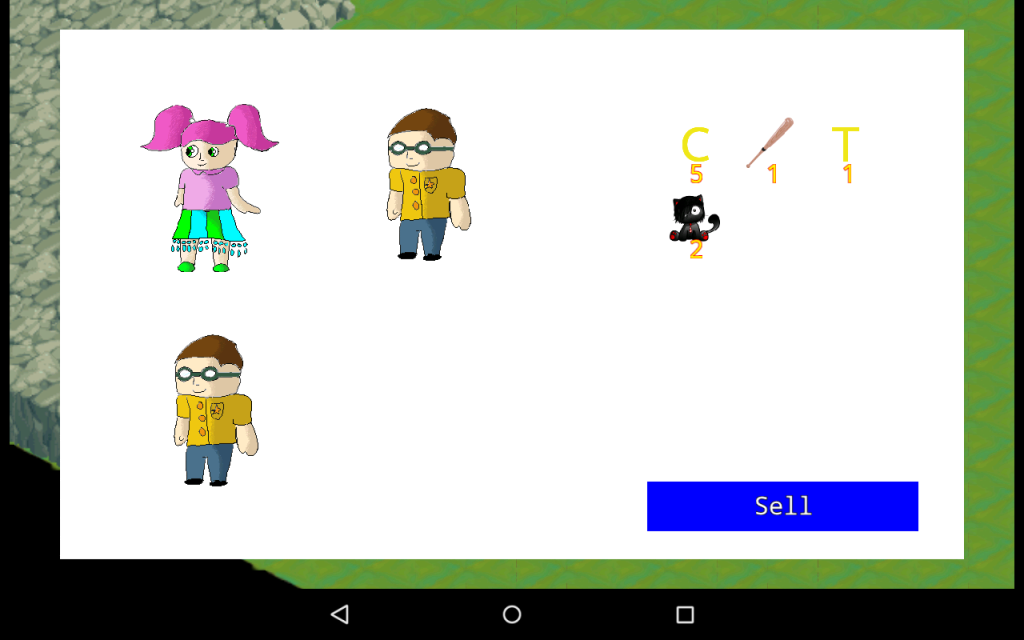
Stay tuned to this website for more updates. You can also follow us on Twitter and Facebook.
Writing your own Locale Pack
You don’t need to be a software developer to contribute to Phoenicia. One of the best ways to contribute is to help develop Locale Packs for teaching literacy in different languages and demographics.
To help you learn how, we’ve published a breakdown of a Locale Pack manifest, detailing everything you need to know to develop your own. Phoenicia will soon be able to give the player a choice of locales for starting a new game, and when it does we will show you how to get yours included.
Development update: Sample levels
Here’s quick walk through five sample levels of Phoenicia, showing the planting and harvesting of letters, the construction of word builders and building the words. It’s taking ideas from the many popular farm/city building games, but rather than growing crops and manufacturing goods, you’ll be harvesting letters and using them to build words.
The build times have all be lowered for the sake of a watchable video. Sound works, but the Android screen recorder doesn’t capture it. I’ll work on getting an audio track recorded for the next video.
Development update: Moving blocks
Sometimes you don’t want to place a new block exactly where you pressed the screen the first time. To make this easier, we’ve implemented an intermediary step that lets you change the location to place the block until you’ve settled on just the right spot. In the future, this may also be used to move blocks after they have been placed.
Development Update: Selling letters
[vc_row][vc_column][vc_video link=”https://youtu.be/rnWlQ3NOjCQ”][/vc_column][/vc_row][vc_row][vc_column][vc_wp_text]Lots of refactoring has been going on in Phoenicia recently, but it’s enabled better inventory handling and not the ability to sell letters (and soon words) for in-game “coins” that will be used elsewhere.[/vc_wp_text][/vc_column][/vc_row]
